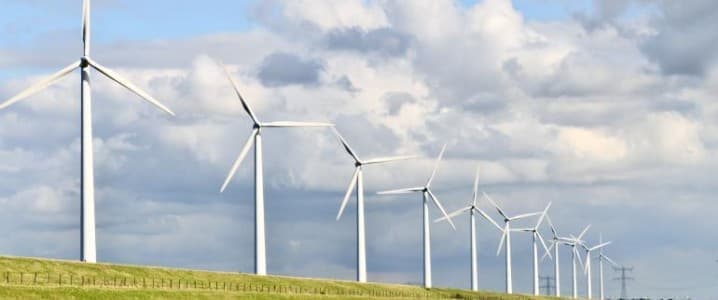The energy transition faces the biggest challenge yet as a global backlash against renewable energy – spearheaded by U.S. President Donald Trump – is gaining momentum, according to two of the European pioneers of wind turbine design.
President Trump’s views on wind energy and climate change are extreme, but they are symptomatic of a global shift in the perception of the need for and benefits from the energy transition, say Henrik Stiesdal and Andrew Garrad, a Dane and a Brit, who are often referred to as the “Godfathers of wind.”
“This sort of change is a very dangerous thing”
Stiesdal and Garrad have won the 2024 Queen Elizabeth Prize for Engineering “for their achievements in advancing the design, manufacture and deployment of high-performance wind turbines, allowing wind energy to make a substantial contribution to the world’s electricity generation.”
Stiesdal was responsible for the turbine design for the world’s first offshore wind farm, while Garrad pioneered the BLADED computational design tool, which allows engineers to model a turbine system and predict its behavior.
After 40 years of helping the world develop wind energy, Stiesdal and Garrad are now concerned that the marked shift in perception of renewables, especially offshore wind energy, could hold back the rollout of clean energy technologies.
“Trump is symptomatic. I mean an extreme symptom of that, but you can see it I think in all Western countries certainly, perhaps not elsewhere,” Garrad told CNBC earlier this month, before being bestowed, together with Stiesdal, with the Queen Elizabeth Prize by King Charles III.
Related: Argentina’s Vaca Muerta Shale Is Smashing Oil Production Records in 2025
President Trump has slammed wind energy, rolled back or scrapped many Biden-era incentives for renewables, and has criticized other countries’ approach to energy policy, including the UK.
President Trump has repeatedly called for the UK to incentivize oil and gas production and “get rid of” wind farms.
At the UN General Assembly in September, the President went on the offensive and attacked clean energy globally, and called climate change “the greatest con job ever perpetrated on the world.” He derided renewable energy as ineffective, expensive, and a financial drag, calling it a “joke”.
President Trump also described windmills as “pathetic and so bad, so expensive to operate” before referring to them as “the most expensive energy ever conceived.”
The “Godfather of wind” Garrad noted that the backlash against wind energy is not “just a wind energy problem.”
“To do this sort of change is a very dangerous thing. And I think it has shown that this is a political business,” Garrad told CNBC.
“It’s a personal decision by a politician, who happens to be a rather powerful one — and it has sent shockwaves around the place.”
According to Garrad, the renewable energy industry now faces a general shift in mood, which needs to be addressed.
Costs Add to Headwinds
The unfavorable regulatory and political climate in Washington is one of the main hurdles to renewable energy and the energy transition. But it’s not the only one. Soaring costs, supply chain issues, high interest rates, power curtailments, and mismatches with grid availability and capacity have added to the headwinds in wind and solar energy in recent years.
Ørsted, the world’s largest offshore wind developer, has become this year the poster child of the current regulatory and structural issues facing the wind energy sector.
Ørsted has recently completed a huge rights issue equal to some $9.35 billion, to cover immediate financing needs amid regulatory uncertainties in the U.S., after the Trump Administration tried to have it stop work at a nearly completed project off the East Coast.
Faced with numerous headwinds, Ørsted last month said it would slash its workforce numbers by 2,000 by 2027, eliminating a quarter of its current roles.
Regulatory changes, cost inflation, and high interest rates have impacted project economics in the offshore wind industry in the past three years.
The economics weren’t fantastic even before 2022, but European oil and gas majors decided to invest in renewables when they announced shifts to net zero and targets to leave their oil production decline.
This shift lasted only a couple of years until energy security became more important—to every country—than sustainability. Big Oil abandoned the ambitious renewables targets and returned to what they do best—pump oil and gas to ensure the energy supply the world needs.
In one of the latest withdrawals, Shell this week exited two offshore wind power projects in Scotland as the world’s top oil and gas firms continue to scale back their investment and involvement in renewable energy.
Shell and the other European supermajor, BP, have shifted focus back to their core oil and gas business. The pivot took place after the energy crisis made energy security and affordability more important than sustainability, while high interest rates and supply chain issues further reduced already meager returns from clean energy projects and made many new energy ventures uncompetitive.
The most competitive projects still go forward, especially in jurisdictions with favorable policies, including China and Europe. Enthusiasm in Europe has waned but the need for domestically generated electricity without the reliance on gas imports underpins continued clean energy development.
The renewable energy industry now has to find its Goldilocks place between the overly zealous proponents and the opponents, branding it “pathetic”.
By Tsvetana Paraskova for Oilprice.com
More Top Reads From Oilprice.com
Oilprice Intelligence brings you the signals before they become front-page news. This is the same expert analysis read by veteran traders and political advisors. Get it free, twice a week, and you’ll always know why the market is moving before everyone else.
You get the geopolitical intelligence, the hidden inventory data, and the market whispers that move billions – and we’ll send you $389 in premium energy intelligence, on us, just for subscribing. Join 400,000+ readers today. Get access immediately by clicking here.



Leave a Comment
Your email address will not be published. Required fields are marked *